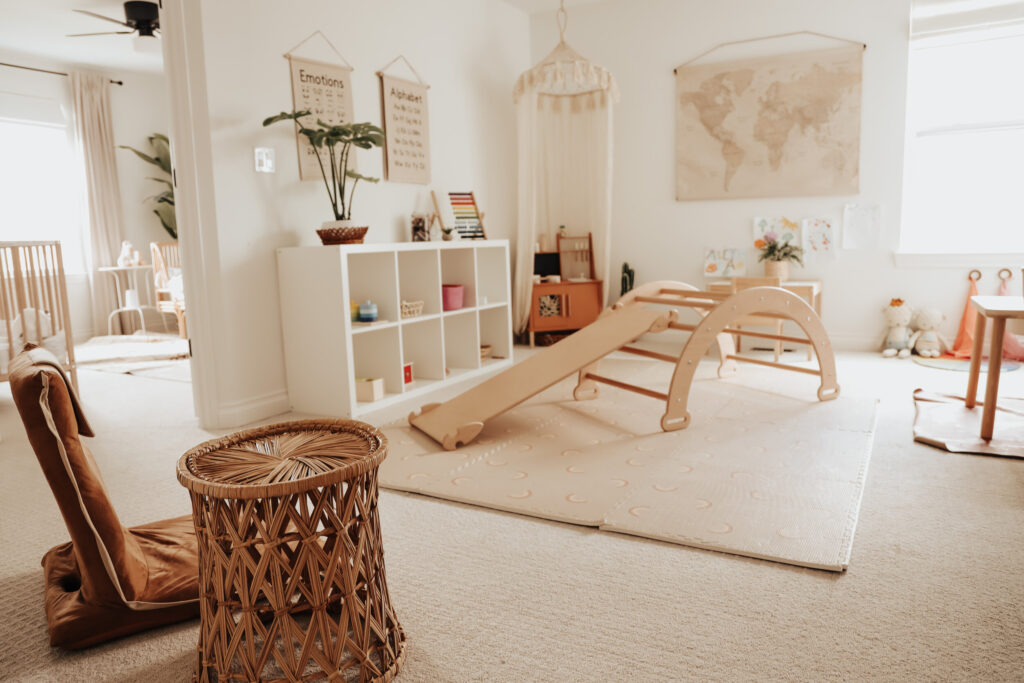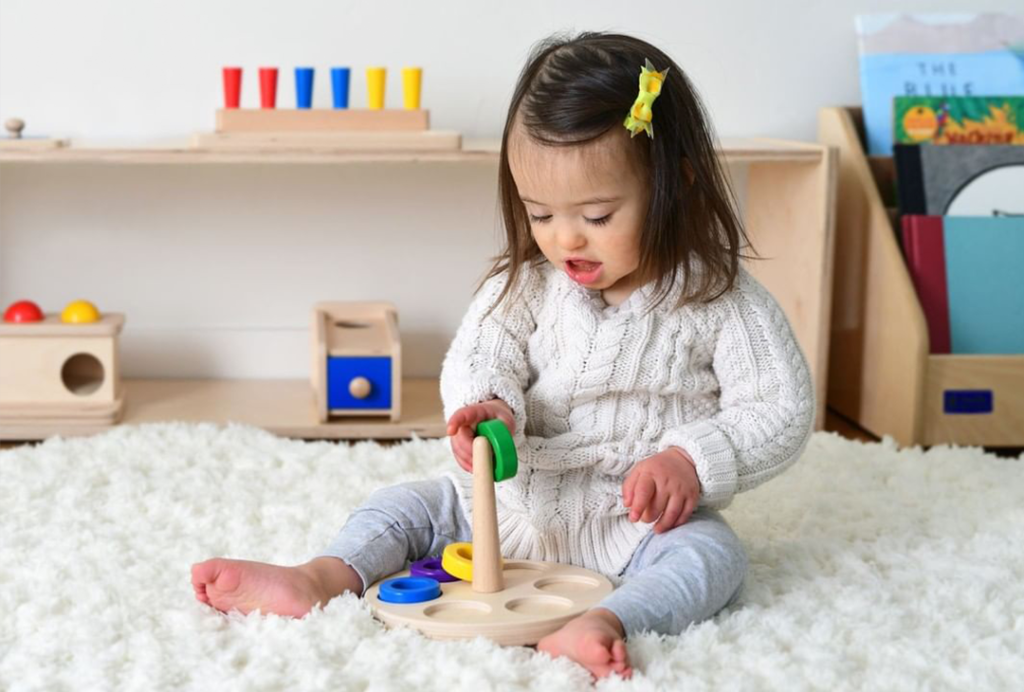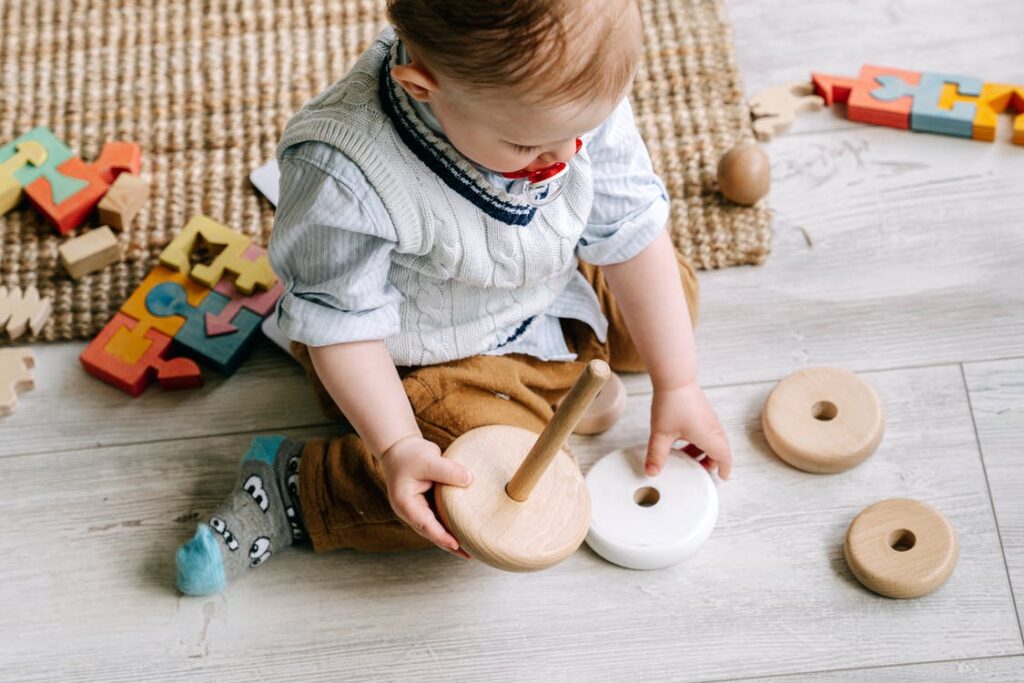We know that Montessori is all about order. We know that children have a sense of order. The Montessori classroom is an orderly environment where every activity has its place.
Montessori teachers encourage children to use one activity at a time and to tidy up each activity after they have finished with it.
As parents, we expect that the Montessori philosophy will help our children to be tidy! The Montessori school is designed for children and leads naturally to order. There are clear rules and expectations and children are more willing to clean up after themselves in the classroom.
What if I tell you that, despite being a Montessori teacher, my children’s bedroom are not orderly. They don’t tidy up spontaneously. There are several reasons for that and I have learned over the years what helps children to tidy up and to stay organised.

The reasons why children don’t tidy up?
You might have heard of the sense of order? This is one of the sensitive periods observed by Maria Montessori. It is now described more as a tendency that all human beings have to make sense of their environment. It’s not so much about “tidy up after themselves” or keeping their bedroom cleaned than about routine, rhythm and knowing what comes next.
But they will express that sense of order about what matters for them. For example, sorting their little people, being obsessed about their collection of pebbles, sleeping with their special teddy is all about that sense of order!
“It seems to him, at this stage, a particularly vital matter that everything in his environment should be kept in its accustomed place; and that the actions of the day should be carried out in their accustomed routine.”
They don’t see you cleaning and tidying!
I have said it already but even the most tidy parent tends to “clean” when the children are not around. Have you ever send your co-parent to the park with the children in order to allow you to do a good clean up session? Do you tend to do everything when they nap? Or do you tend to tidy up all their toys at the end of the day when they are in bed?
Stop now and do as much as you can in front of them. Montessori is about teaching life skills and independence so taking care of the environment is something that I would advise you to focus on. Teach your child to fold the laundry, to do the dishes, empty the dishwasher, setting up the table and cleaning the windows!

How to help children to tidy up
- Work on yourself: if you are not naturally tidy, start with you! Do a big decluttering session, try to understand why it’s hard for you to be orderly. Seek support if needed. Your children will thank you!
- Equally, if you are a very tidy person, lower your expectations as yes having a spotless house when we have children is just not possible. Review your definition of what is a tidy home.
- Be a role-model: clean in front of your children. Even if you have a cleaner, make an effort to do a task with them as a way to teach them how to.
- Involve them in the cleaning tasks: young toddlers, generally, love to clean! Give them child-size tools and don’t expect a brilliant result. Let them enjoy the process.
- Have less activities and toys available. The less there is to tidy, the easier it will be. Halve the amount of legos, blocks, train parts… Those sets tend to be difficult to tidy and children are discouraged and stop cleaning up after themselves if they are overwhelmed by the task.
- Have a place for everything. Make sure you know the spot for each toy/activity and their belonging. At the beginning of your Montessori journey, you might still move things around but try to limit big overhaul as it disturbs their sense of order and will prevent them to put back what they have used.
- Make it playful: have a tidy up song! or a silly dance. Make the animals going back to their basket, making sounds. Find what works for your child.
- Wait for when they are ready: when children are in a flow, playing intensely, it’s hard to know when it’s time to tidy up. It might be dinner time but they might not be ready to stop playing. Wait for the moment they naturally seem to move onto a new activity to encourage them to put the previous one back on the shelf.
- Help them! It’s a skill, don’t expect them to do it consistently even if they have done it a few times. Like us, they are allowed cheat days.

What about older children?
Children in the second plane of development are messier than younger children. They are less interested to organise the environment. They are less interested in practical life. They tend to spread out when they explore a topic. It’s because it’s an age when they make connection between concepts.
Their play area and toys might be in their bedroom. Their bedroom is their private area and you might be less around when they play. Children in the second plane have access to toys that have small parts (legos! Beads, …).
You can still rotate toys for that age group. You can have a rule that the legos are stored in the living-room or the crafts only accessible at the dinning table. I recommend that you limit what they have access to in their bedroom. Make it part of the daily routine to tidy up for half an hour before dinner.
The bottom line:
Mess is part of life but being tidier, as a family, will help everyone.
Having said that, let’s close with this quote:

